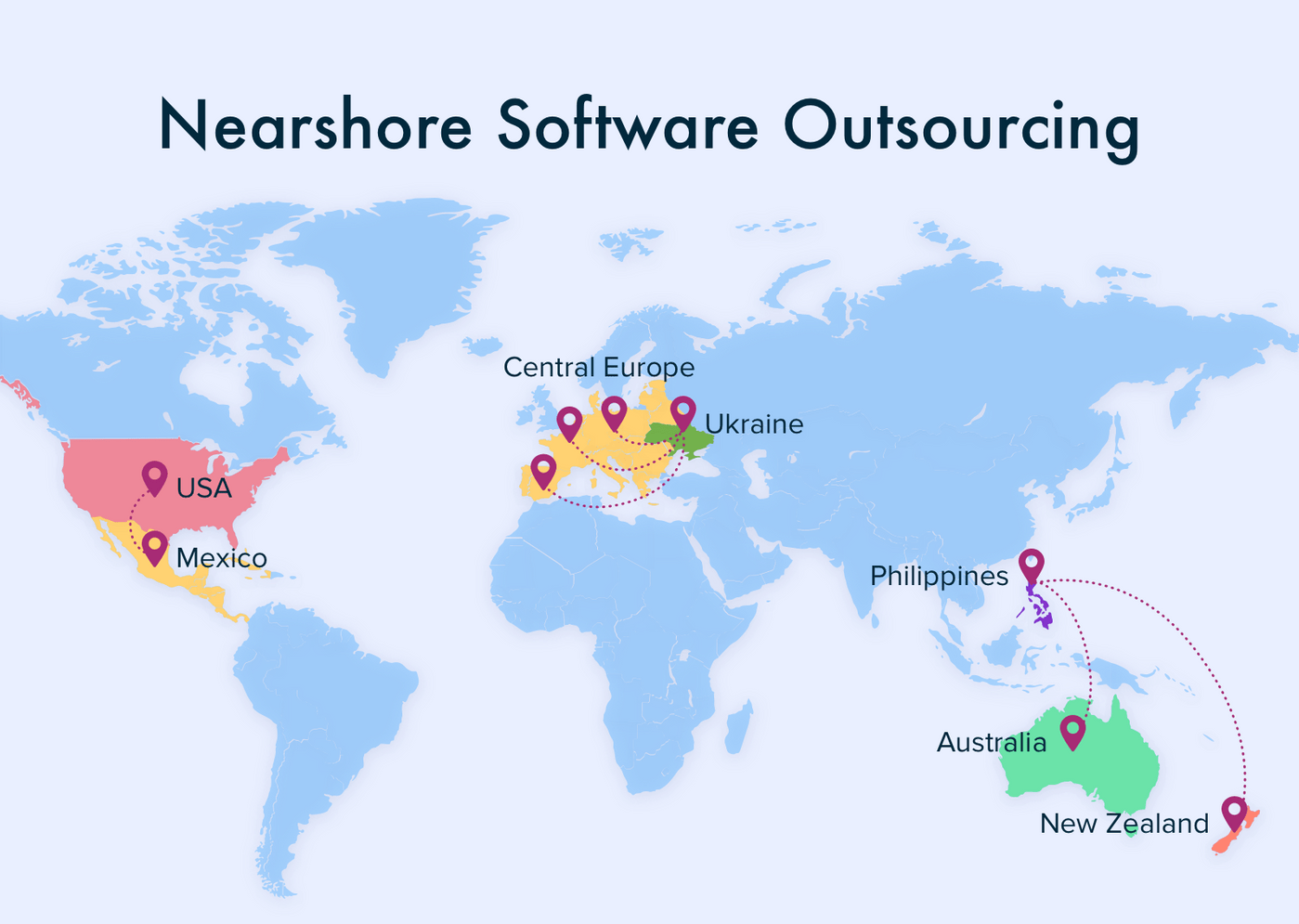With nearshore software engineers at the forefront, companies can tap into a pool of talent that offers efficient solutions while fostering seamless collaboration. Let’s delve deeper into the world of nearshore software engineers and discover the key advantages they bring to the table.
This article will explore the qualifications, best practices for hiring, and strategies for effective collaboration with nearshore software engineers.
Understanding Nearshore Software Engineers

Nearshore software engineers are professionals who work remotely for companies located in neighboring countries or regions with similar time zones. This outsourcing model allows for closer collaboration and communication compared to offshore teams located in distant countries.
Benefits of Working with Nearshore Software Engineers
- Improved Communication: Nearshore software engineers are easier to communicate with due to shared time zones and cultural similarities, leading to better collaboration and understanding.
- Cost-Effectiveness: Nearshore outsourcing can be more cost-effective than hiring in-house developers or working with onshore teams, as labor costs may be lower in neighboring countries.
- Quality Talent Pool: Nearshore software engineers often possess high-quality technical skills and expertise, providing a competitive advantage for companies seeking top talent.
- Flexibility and Scalability: Nearshore teams can easily adapt to changing project requirements and scale resources as needed, offering greater flexibility compared to in-house teams.
Comparison with Offshore and Onshore Software Engineers
- Offshore Software Engineers: Offshore teams are located in distant countries with significant time zone differences, which can lead to communication challenges and longer response times. Nearshore teams offer better communication and collaboration opportunities.
- Onshore Software Engineers: Onshore teams work within the same country or region as the company, allowing for face-to-face interactions and immediate responses. However, onshore development costs are typically higher compared to nearshore or offshore options.
Qualifications and Skills
When it comes to nearshore software engineers, there are specific qualifications and skills that are essential for success in this role.
Qualifications, Nearshore software engineers
- Bachelor’s degree in Computer Science, Software Engineering, or a related field
- Relevant certifications such as AWS Certified Developer, Microsoft Certified: Azure Developer, etc.
- Previous experience in software development projects
- Strong problem-solving skills and attention to detail
Technical Skills
Having the right technical skills is crucial for nearshore software engineers to effectively work on projects and deliver high-quality results.
- Proficiency in programming languages such as Java, Python, C++, etc.
- Experience with software development tools and technologies like Git, Jira, Docker, etc.
- Knowledge of software design principles and best practices
- Ability to work with databases and understand data structures
Language Proficiency
In addition to technical skills, language proficiency is also important for nearshore software engineers due to the nature of their work.
- Fluency in English is often required to communicate effectively with clients and team members
- Knowledge of additional languages can be beneficial when working with clients from different regions
- Clear and concise communication skills are essential for conveying complex technical concepts
Best Practices for Hiring Nearshore Software Engineers

When looking to hire nearshore software engineers, it is crucial to follow best practices to ensure you find the right talent for your team. This involves effectively sourcing and recruiting candidates, evaluating their expertise, and considering cultural fit.
Steps to Effectively Source and Recruit Nearshore Software Engineers
- Define your requirements clearly: Before starting the hiring process, make sure you have a clear understanding of the skills and experience you are looking for in a nearshore software engineer.
- Research reputable nearshore software development companies: Look for companies with a proven track record of delivering high-quality work and positive client testimonials.
- Utilize online platforms: Use online job boards, professional networking sites, and freelance platforms to reach a wide pool of nearshore software engineers.
- Conduct thorough interviews: Once you have shortlisted candidates, conduct detailed interviews to assess their technical skills, problem-solving abilities, and communication skills.
Tips for Evaluating the Expertise of Nearshore Software Engineers
- Review their portfolio: Ask for samples of their previous work to evaluate the quality of their code and projects.
- Assess their technical skills: Administer technical tests or coding challenges to gauge their proficiency in programming languages and development tools.
- Check references: Reach out to their previous clients or employers to get feedback on their performance and work ethic.
The Role of Cultural Fit in Selecting Nearshore Software Engineers
- Understand the importance of cultural fit: Cultural fit is essential for a cohesive team dynamic and successful collaboration, so consider how well a candidate’s values and work style align with your team.
- Communicate effectively: During the interview process, discuss your company culture and values to see if the candidate resonates with them.
- Consider language proficiency: Ensure the nearshore software engineers you hire are proficient in the language you primarily use for communication to avoid any misunderstandings or miscommunications.
Collaboration and Communication
Effective collaboration between in-house and nearshore software engineers is crucial for the success of any project. Here are some strategies to foster collaboration and enhance communication:
Utilize Collaboration Tools
- Implement project management tools like Jira or Trello to assign tasks, track progress, and ensure transparency in workflow.
- Use communication platforms such as Slack or Microsoft Teams for real-time messaging, file sharing, and group discussions.
- Organize regular video meetings via Zoom or Skype to facilitate face-to-face communication and build rapport among team members.
Establish Clear Communication Channels
- Set up clear guidelines for communication protocols, including response times, preferred channels, and escalation procedures for urgent matters.
- Create a centralized repository for documentation, code repositories, and project updates to ensure that all team members have access to the latest information.
Addressing Challenges of Remote Collaboration
- Overcome time zone differences by establishing overlapping work hours for both in-house and nearshore teams to facilitate real-time collaboration.
- Encourage cultural sensitivity and understanding among team members to bridge any communication gaps and foster a harmonious working relationship.
- Regularly evaluate and optimize communication processes based on feedback from team members to address any challenges that may arise during remote collaboration.
Final Thoughts

In conclusion, nearshore software engineers present a valuable resource for companies looking to optimize their operations and enhance teamwork across borders. By leveraging their expertise and embracing effective communication practices, businesses can achieve remarkable results in today’s interconnected world.
Helpful Answers: Nearshore Software Engineers
What are the benefits of working with nearshore software engineers?
Nearshore software engineers offer cost-effective solutions, similar time zones for better communication, and cultural alignment with Western countries.
What qualifications are required for nearshore software engineers?
Typical qualifications include a degree in computer science or related fields, relevant certifications, and previous experience in software development.
How can companies effectively evaluate the expertise of nearshore software engineers during the hiring process?
Companies can conduct technical interviews, review past projects, and request coding samples to assess the skills and capabilities of nearshore software engineers.
What are some examples of communication tools that can enhance collaboration between in-house and nearshore software engineers?
Tools like Slack, Microsoft Teams, and Zoom can facilitate real-time communication, file sharing, and project management for seamless collaboration.
How important is language proficiency for nearshore software engineers?
Language proficiency is crucial for effective communication and understanding project requirements, ensuring smooth collaboration between teams in different locations.
